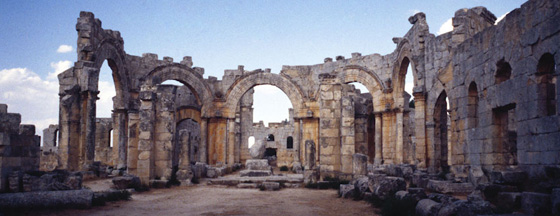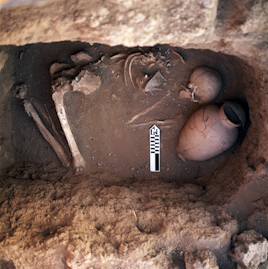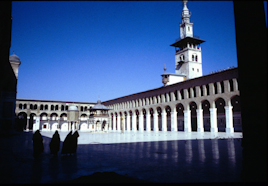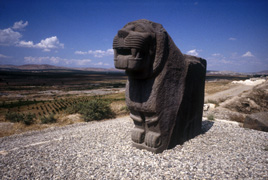Projects : Cultural Heritage & Law
Since wars begin in the minds of men, it is in the minds of men that the defenses of peace must be constructed… ignorance of each other's ways and lives has been a common cause, throughout the history of mankind, of that suspicion and mistrust between the peoples of the world through which their differences have all too often broken into war.

The wars, conflicts, and genocides of the last decades—for example in: Bosnia-Herzegovina, Kuwait, Iraq, Afghanistan, Palestine, Israel, Rwanda, the Congo, and Somalia—are among the many brutal reminders of ongoing strategies employed to destroy the identities of marginalized and minority groups.
Because cultural heritage is an essential component of human identity, the destruction, looting, and illicit traffic of cultural patrimony have implications that extend well beyond basic ownership and property rights.

In their most extreme form, such actions can constitute a base violation of human rights known as "cultural genocide", "cultural cleansing", or "ethnocide"—terms that describes the purposeful destruction of cultural forms, such as architecture, art, theatre, literature, language, and other traditions, with the aim of erasing the individuality and distinctiveness of a specific community or group.
This crime differs from other forms of genocide in that it leaves its victims alive, while insidiously destroying the cultural traditions, symbols, icons, languages, and other reference points that create identity. Examples of historically recent acts that have the outcome of eroding the identities of conquered and/or marginalized people include:
- The destruction in Bosnia and Herzegovina of "Muslim" monuments including the 16th century Mostar Bridge.
- The destruction and looting of the National Museum of Kuwait and of the Dar al-Athar al-Islamiyyah (House of Islamic Antiquities) by the Iraqi military during their 1990 invasion—during which over 7000 objects and 5000 volumes of books and manuscripts were transported to Baghdad.
- The decree in 2001 in Afghanistan, by the Taliban, ordering the destruction of all "pre-Islamic artifacts," resulting in the destruction of artifacts housed in the Kabul Museum and the demolition of the statues of the Great Buddha at Bamiyan.
- The looting of the Iraqi National Museum and of regional museums and archaeological sites; and the use by occupation forces of Iraqi cultural heritage sites as military bases, including: the ancient Mesopotamian royal cities of Ur, Babylon, Kish, and the 9th century Islamic capital of Samarra.
- The looting, and destruction of Iraq's major libraries and archives including, among many others: the Iraqi National Library and Archives, Ottoman/Hashemite Archives; the illegal removal of the Jewish Iraqi Archives and the Ba'ath Party Archives to institutions the United States.

The treaties and conventions that govern the protection of cultural heritage are part of an ongoing process to codify and ratify international laws and to make it possible to prosecute people not only for theft and illicit trafficking in cultural artifacts, but for human rights violations including the destruction, looting, and failure to protect monuments, heritage sites, museums, libraries, and archives, during wartime.
You can read more about these laws and standards here.
The Iraq War & Archaeology (IW&A) Project
Stuff happens! ... And it's untidy, and freedom's untidy, and free people are free to make mistakes and commit crimes and do bad things. They're also free to live their lives and do wonderful things, and that's what's going to happen here...
The images you are seeing on television you are seeing over, and over, and over, and it's the same picture of some person walking out of some building with a vase, and you see it 20 times, and you think, "My goodness, were there that many vases?" (Laughter.) "Is it possible that there were that many vases in the whole country?"
The Iraq War & Archaeology Project documents the impact of the Iraq War on the archaeological heritage of Iraq. It provides a knowledgeable and exhaustive and accessible one-stop source of reference for scholars, journalists, policy makers as well as the general public. The news and information has been archived in semimonthly archives going back to April 2003.

Until 2008, when Dr. Francis Deblauwe ceased to continue work on the site the site, new information was gathered from web sources (published in English, French, German, Dutch, Italian, etc.) as well as from Cultural Heritage, Archaeology, military and government professionals, on an almost daily basis.
That information was extracted, reviewed, and often translated into English accompanied by occasional comments and hosted as a joint project by Archaeos and by the Institute of Oriental Studies of the University of Vienna (Austria).
The project members are:
Editor and Director, Dr. Francis Deblauwe
Co-director, Prof. Gebhard Selz (University of Vienna, Austria)
Co-director, David Nelson Gimbel (Archaeos, Inc.)
Extra web site features include an estimate of the losses at the National Museum in Baghdad, a list of archaeological sites known to have been looted/damaged, and a list of relevant external web sites. The Project also publishes a free digital series, IW&A Documents.
In 2010, the archives of the Iraq War & Archaeology Project were moved to a new location (further information is available in our resources section).
Related Resources
Cultural Heritage
- International Institutions & Organizations
- National Institutions & Organizations
- International Conventions
- International Pacts and Treaties
- International Laws and Statutes (Databases)
- UN Resolutions
- UNESCO Conventions
- UNESCO Recommendations
- UNESCO Declarations
- Miscellaneous UNESCO Documents
- ICOMOS Charters (General Assembly)
- ICOMOS Charters (National Committees)
- ICOMOS Resolutions and Declarations (Symposia)
- US Acts and Federal Statutes
- Other Charters & Standards
- Looting, Theft & Destruction
